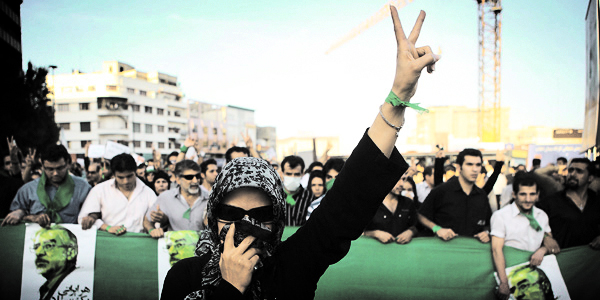twitter me this: iran, protests and social media
for those of you who decided to disconnect from absolutely any media outlet, social media site or the entire communicative human race over the last several days, let me catch you up to speed with what’s going on in iran right now.
last friday (june 12), iran held presidential elections. incumbent mahmoud ahmadinejad is a real piece of work (famous for denying the holocaust, calling for the dissolution of israel, letting the world know there are no gay people in iran and, most importantly, starring—sorta—in the SNL digital short that you can view below…) and was challenged, primarily, by reformist mir-hossein mousavi. ahmadinejad, not surprisingly, won in a landslide (approximately 62% of the vote). he was declared the winner a mere two hours after the polls closed, so it—rightfully so—created quite the suspicion. soon after, protests broke out throughout tehran, with mousavi’s supporters demanding an investigation and recount.

one of the big headlines in the midst of this has been the prolific use of twitter for communication amongst mousavi supporters and protesters. what even further heightened the buzz concerning twitter was the decision by twitter (with prompting from, interestingly, the state department) to defer the long-scheduled outage planned for june 15. the outage would have taken place in the states around 1:30 a.m. (lasting approximately 1 hour), which would have placed the outage in daytime hours in iran—key hours for online communication among protesters. instead, twitter changed the outage times to 1:30 a.m. iran time and daytime hours here in the states. needless to say, when massive network maintenance by one of the world’s largest social networks is changed last second for global political purposes, it’s safe to say that twitter has moved from novelty to necessity.
now, allow me, after saying all that, to bring a bit of a reality check. there’s nothing like a little media hype to get a story rolling. tech analysts now say that whereas twitter was certainly a communication tool used by protesters, its impact has most likely been overstated. they say that most of the protest organizers used either text messaging and/or just good ol’ word of mouth to rally people. again, that isn’t to completely diminish the role of twitter, but it does bring a bit of perspective to the media portrayal. what analysts do say, though, is that twitter played a crucial role in international awareness and support, which is critical for mass political and ideological movements. there are certainly other global considerations that are much more dire than the iranian presidential elections throughout the world, but they haven’t been able to bring a mass level of global awareness. the use of twitter (and other social media networks like facebook) has certainly done that in iran.
much has been said about the narcissistic and frivolous nature of twitter, specifically. detractors say that it’s a barrier to real communication and community and that it cheapens public discourse. several months ago, a debate ensued among religious bloggers about whether or not online community is real community (while the debate focused primarily on blogs, it quickly included social media services like twitter). further, it doesn’t take long watching various talk shows and news outlets to see that whereas twitter has become somewhat ubiquitous in society, there’s always the “counterpoint” person ready to give 20 reasons why twitter is worthless. it’s clear that twitter has its fair share of detractors.
with all that said, i find great value in twitter. in fact, it’s by far my favorite social media network. i don’t do facebook (besides for the church) and i rarely log onto myspace (in fact, i just checked and the last time i logged in was january 20). without getting into all the things that annoy me on and keep me from personally using facebook, i love the fact that twitter streamlines social communication to a straightforward 140 characters. nothing more. simple, quick communication. whereas i primarily use twitter for light-hearted social interaction, it’s also a great source of constant information and creative sparks of interest. i love following people who just say goofy stuff just as much as i love following people who put up bits of provocative and insightful thoughts on theology. i follow people who i don’t know at all and i follow people i see very regularly.
i’m not suggesting that twitter is going to facilitate global political movements or create world peace, but i certainly think the nature of twitter (instant, straightforward, no frills) can be a gateway of connectivity and further social interaction online (linking to blogs; an extension of facebook/other social media sites; and leveling of perceived power of individuals).
so, we’ll certainly continue to see how twitter plays out in iran as well as throughout the rest of the world’s online social community.
in the meantime, you can do two things: follow me on twitter and watch this brilliant video:












